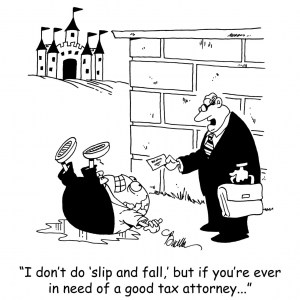Stopping and Preventing IRS Collection
It is an absolute certainty that in the months to come, thousands of taxpayers will find themselves financially wiped out because of IRS collection. The real tragedy lies in the fact that perfectly legal and highly effective defense tactics could have shielded the taxpayer from rabid IRS employees.
My observation is that people fail to act because the get wrong information from the wrong people. Or people are fearful the IRS and buy into the false belief that they need to beg for mercy. And there are the folks who fool themselves into believing the problem will go away – but it doesn’t go away and the taxpayer is slammed down between the pavement and the hard ground.
That’s not what I want for you.
As this chapter explains, you don’t have to gravel on your hands and knees before the IRS. Learn how to: [A] Prevent IRS Collection from Starting or [B] Stop IRS Collection Already in Progress. While you read this chapter, keep in mind that there is often more than one way to resolve a tax problem, and the solution you choose will depend on the set of facts unique to you.
Proven Collection Defense Solutions
Keep in mind that not all of these solutions may apply to you.
Form 1127 – Extension of Time to Pay Tax without Penalty. Acceptance of Form 1127, known as an Application for Extension of Time for Payment of Tax, permits a citizen to file his or her return and be granted an extra six months to pay the tax liability without penalty. The IRS will grant the extension upon a showing that the citizen exercised reasonable care and the tax cannot be paid due to circumstances beyond the citizen’s control. However, if the tax is not paid at the end of six months, penalties will be assessed.
Extension of Time to File. Perhaps you already know about this. Virtually anyone can get an automatic 6-month period to file an extension by completing Form 4846. However, a penalty is assessed for paying late and for not paying the tax due. Filing an extension buys time, but it’s a short-term and often expensive solution.
Partial Pay Installment Agreement. This is covered in detail in another library article. The concept is to pay only what you can afford every month, even if the monthly payments will never repay the tax. Once the IRS agrees to a partial pay plan, they leave you alone. Some of my clients use this solution to “run out the clock” on the time to collect the tax.
Installment Agreement. An installment agreement will both prevent and stop collection. The IRS cannot levy or seize property while the request for an installment is pending, or for 30 days after denial or termination of an installment agreement, or during the time the appeal of a denied or terminated installment agreement is pending.
Streamline Installment Agreement. If you owe $50,000 or less, an installment agreement is easy, and it’s called a streamlined agreement. If you owe over $50,000, it requires negotiation and submitting Form 433-A to the IRS. Keep in mind that because interest continues to pile up while you’re in the agreement, you may pay for years and not reduce much of the balance owed.
TIP Many of my clients who owe more than $50,000 still qualify for the streamline agreement. The thing to do is obtain your master tax transcript and deduct the penalties and interest in calculating eligibility.
TIP If you can’t pay your tax liability through an installment agreement in less than five years, consider other options, such as bankruptcy or an offer to settle or partial pay or hardship. An installment agreement is often a short-term solution, and you must be current on your tax filings to qualify.
Offer in Compromise (OIC), also Known as Tax Settlement. This is explained in detail in my free book as well as articles on this site. The OIC has the dual benefit of putting IRS collection hold and resolving the tax debt. An offer is submitted to the IRS to settle the tax for less than the full balance. The IRS cannot file a levy or seize property while the offer is pending.
Currently Not Collectible (CNC). This is discussed in detail in another library article and my free book. Currently Not Collectible or “hardship” may be the most overlooked tax solution because it at once stops collection and solves a long-term problem. For those who qualify, CNC may be used as an alternative to bankruptcy, offers in compromise, and installment agreements.
Bankruptcy. This topic is explained in much greater detail in another library article under “bankruptcy.” Look, bankruptcy is not for everyone, yet when it is the right solution, even the bleakest tax problem can be utterly transformed into a positive gain for the citizen. Filing bankruptcy not only shuts down IRS collection, it may also eliminate all or much of the tax liability.
Innocent Spouse Defense. Filing an innocent spouse claim prohibits the IRS from collecting until it’s decided whether the innocent spouse is responsible for the other spouse’s tax debt. The innocent spouse claim is a fairness defense. The idea is to show the IRS that one spouse was incurring tax liability or engaging in conduct of which the innocent spouse had no knowledge.
If you’re inerested in learning more about how to defend against the IRS, let’s talk. We use these strategies just about every day. We have a complete command of the little details that can make or break a successful IRS defense.
I’m here to help you turn the tables on the IRS. Please feel free to call 24 hours a day: 414 771 9200.
Tax Law Help: Defend Against The IRS
Contact Us Today
Okay, we discussed no less than eight proven strategies to stop or neutralize collection by the government. Now let’s discuss what you can do if some of those strategies are not successful.
You see, what the IRS won’t tell you, is that just about every decision the IRS makes – from big to small – can be appealed. And then it can be appealed again. Understandably, the IRS would rather not advertise the second and third chances available to taxpayers. And yet it’s vital you know your rights because candidly many of our clients’ greatest successes happen on appeal.
The Right of Appeal
Collection Due Process Appeal (CDP). The CDP is the most powerful method to defend against enforced collection. Collection due process rights include participation in a hearing to explore collection alternatives such as an offer in compromise or payment agreement. Even the tax liability itself can be challenged in a CDP. The appeal is a fresh look within a division often more receptive to resolving the tax problem than a stubborn revenue officer. You are allowed 30 days from the date of an IRS final notice to file a CDP.
Equivalent Hearing. If a levy or lien started and the 30 day deadline to file a Collection Due Process hearing was blown, the alternative is to request an Equivalent Hearing. An Equivalent Hearing is similar to a CDP, although in the event the taxpayer is not successful, it’s the end of the line, and unlike a CDP, an appeal to U.S. Tax Court is not permitted.
A broad range of issues can be raised at a CDP or an Equivalent Hearing. Innocent spouse defenses can be asserted. The appropriateness of IRS collection can be challenged and tax resolution agreements may be reached, such as installment agreements, hardship agreements, or agreements to file an offer in compromise.
TIP Appealing an IRS collection notice puts the brakes on liens, levies, and seizures. Audit findings, installment agreements, offers in compromise, and other issues can also be appealed. If the CDP appeal is unsuccessful, the United States Tax Court will decide the matter.
Taxpayer Assistance Order. If a levy or tax lien creates undue hardship and a Taxpayer Assistance Order is issued, collection will come to a screeching halt and alternative collection will be considered. A Taxpayer Assistance Order may be just the right cure for a revenue officer who fails to act in accordance with the language and spirit of the Internal Revenue Manual.
TIP The IRS cannot seize bank accounts or assets of a corporate entity in order to collect a personal tax liability unless [A] it is first established that the citizen possesses an ownership interest in favor of the assets of the corporate entity; and [B] a charging order is obtained by the IRS. However, the IRS can intercept income paid from the corporate entity to the responsible individual. This raises an interesting and much more involved discussion of how to legally use corporate entities to shield assets and income from creditors, including the IRS. Feel free to contact us on this subject.
United States Tax Court. This court is the “great equalizer” for citizens and businesses facing IRS problems. Without our tax court, the IRS would be invulnerable to checks and balances on its power. Here are some examples of where tax court plays a vital role in protecting hard-working citizens from IRS abuse.
- You are not successful at a Collection Due Process hearing. The U.S. Tax Court has jurisdiction to hear disputes involving citizen opposition to IRS levies and liens, as well as IRS denial of innocent spouse relief, offer in compromise, penalty abatement, and other tax relief.
- You receive a “Notice of Deficiency” claiming you owe tax. A petition may be filed with the U.S. Tax Court within 90 days of the notice, and the tax liability need not be paid until the case is resolved. These are called deficiency cases.
- You are denied innocent spouse relief. You have 90 days from the date of the final determination in which to file a petition in U.S. Tax Court seeking a review. While the 90 days are pending, and while the Tax Court case is pending, the IRS cannot take collection.
U.S. District Court. With respect to real or personal property on which the United States claims a lien, the United States can be sued to quiet title.
Caution! Get a lawyer licensed in the United States Tax Court, Federal Court, and Bankruptcy Court. A CPA or enrolled agent is not licensed to appear in these courts, and tax resolution companies never go near these courts either.
Neutralizing IRS Revenue Officers
When the tax problem has become serious, it’s not unusual for an IRS revenue officer to make an unannounced home or business visit. If this happens to you, remember your rights:
- You do not have to let the IRS revenue officer into your home or business. Don’t be intimidated, and call a tough tax lawyer who will protect your legal rights.
- You do not have to speak with a revenue officer. You can have your tax lawyer do the speaking for you—he or she will know what to say and what not to say.
- You do not have to sign any document they put in front of you. Seek a tax professional before signing any document or agreeing to any terms.
- You do not have to accept their initial offer. The IRS is not looking after your best interests. Their first offer is quite often not their best offer.
Remember, these guys play the game all the time. You don’t. So be wise.
You Have Power!
The same laws the IRS uses as a sword can and should also be used as a shield against IRS collection and abusive tactics. You really do have power the IRS would prefer you didn’t know about!
If you would like an aggressive and experienced clever tax lawyer on your side, call Michael Mack at 414 771 9200.



